.....................................
|
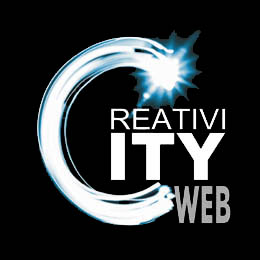 rivista di culture del piano per la città creativa
rivista di culture del piano per la città creativa |
...... .............................
| ... |
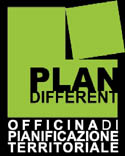
|
...... .............................
|
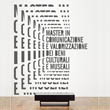
master di II livello in
Comunicazione e valorizzazione dei beni culturali e museali |
...... ..............................
| ... |
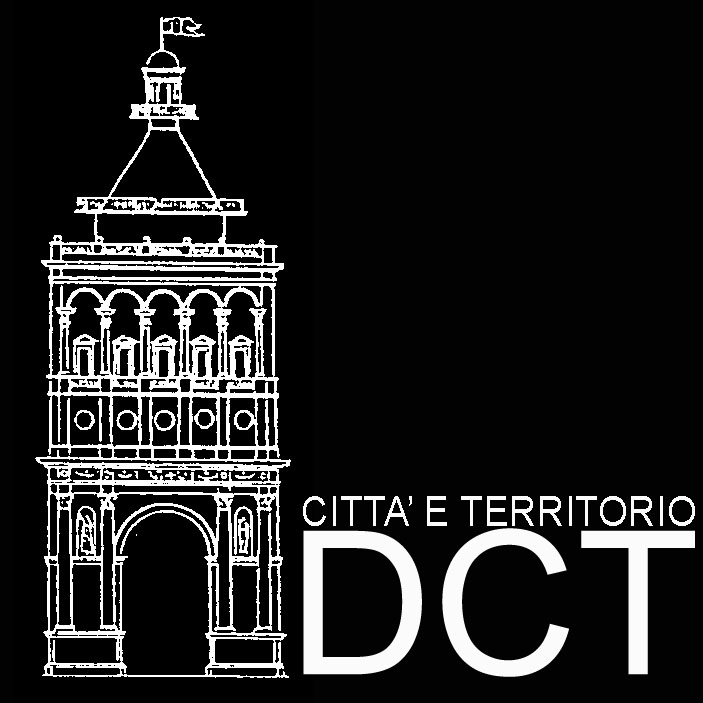
Dipartimento
Città e Territorio |
...... .............................
| ... |

Amici del
MUSEO RISO |
...... .............................
......The photo of the
......heading is made by
......Francesco Seggio
...... ......
TAGS
urbanism | planning | architecture | creative cities| cultural heritage| urban regeneration| local cultural district| city future| urban policies| waterfront | superplaces | school of architecture| meridian corridor| urban center | palermo | sicily | urban planning lab| creativicity | plan different | port atelier| city-port | gis | disused area| communication for cultural heritage| landscape plan| next city | socal housing| department of architetcture| catania | barletta | dicoter | italian society of urban planning| ports and stations| new urban magnets| innovation | port masterplan| liquid city| port-city interface | smart city | multilevel governance | strategic platform | network | fluxes | strategic planning | reload |
activities and events
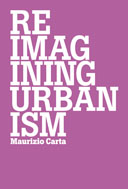 |
|
| Reimagining Urbanism. Visions and strategies |
Reimagining urbanism requires a rigorous exercise of will, responsibilities and competencies that are based on a system of urban governance based on new development pentagram: vision, strategy, design, rules and community. A different thought and an innovative chain of actions for the new times, able to reimagine the urban project. Cities of the future - smart, creative and green - must act within a state of perturbation that will not disappear soon. They will reactivate their capital guided by a planning can ensure the convergence of new forms of cultural, economic, environmental and social sustainability through the adoption of new visions of the future, either through the use of new paradigms but also through the quality of decisions and the performances of projects. [coming soon]
.........................................................................................................................
|
|
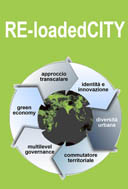 |
|
| Re-loaded City. Strategies for urban recycle |
Within the Framework of Horizon 2020, the Research Unit of Palermo approaches the key theme of RECYCLE applying it to the regeneration of urban and suburban settlements assigning new life cycles to urban complex, human settlements and infrastructure networks, disused, chancing or with shrinking functions. The Shrinking City produces several urban "fragments", functional "chips" and "scrap" of development that, through a recycling process/project, can be brought back into urban infrastructures for new cycles of life. These urban materials can be recycled to produce a new “urban software” proceeding from rewriting and recombination of still efficient "lines of code" (functions, resources, tissues and architectures): the RE-loaded CITY. [open]
.........................................................................................................................
|
|
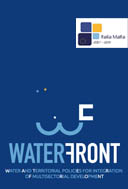 |
|
| Waterfront between Sicily and Malta |
The project "Waterfront", (Water and Territorial policiEs for integrRation oF multisectoRial develOpmeNT), aims to define guidelines, strategies and operational tools for planning of urban and suburban coasts, based on cross-border exchange of experiences Malta-Sicily. The project Waterfront will enhance the conditions of environment for the transformation and development of the coastal tracts of the provinces of Trapani and Palermo and those of Malta improving techniques about territorial planning and through the exchange of experiences and the dissemination of good practice among the partners involved. [open]
.........................................................................................................................
|
|
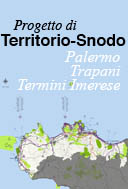 |
|
| Plan for "territorial hub" of Western Sicily |
The most recent planning proposals of the Municipality of Palermo are powered by a metropolitan vision capable of leading the formation of productive and innovative urban clusters, the set up of territorial platforms, the re-centralisation of urban areas through the redevelopment of the nodes and the provision of public services, but also by redefining high-ranking metropolitan functions able to enhance the role of "Gateway City", acting as a "transformer" of the flow of resources, tangible and intangible, that cross their land. In such a strategic scenario, integrated and oriented to urban regeneration, acts the "Progetto di Territorio Snodo" drawn up by the city of Palermo, with the technical assistance of PricewaterhouseCoopers and the involvement of the municipalities of Termini Imerese and Trapani and the provinces of Palermo and Trapani. [open]
.........................................................................................................................
|
|
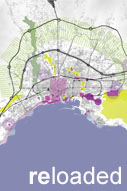 |
|
| Palermo Reloaded |
When a complex system does not work and does not reach the desired results, when its performances are low, when the relations between the parties are congested, when it consumes resources and dissipates energies, when emergency interventions are not effective, but despite all the qualities and the potential values are still intact, then you need to "reload the operating system."
Palermo Reloaded is the key word that characterizes my experience as a Councilor for the strategic plan and for the urban regeneration of the old town and the title of my next book emerged from this experience. The book collects ideas, experiments and directions to reactivate the metabolism of the city and to improve the regeneration process, quality and competitiveness. [open]
..........................................................................................................................
|
|
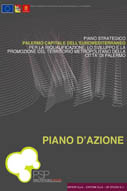 |
|
| Strategic Plan for Palermo |
The Strategic Plan for Palermo (approved in June 2011 by the Sicilian Region) proposes a process capable of acting over the city by identifying the necessary strategies (local and wide), activating its urban policies, drawing up working plans for upgrading, developing and identifying the resulting rules to facilitate the implementation of strategies and projects, in the certainty of decisions, time and more effective procedures. The innovation of the planning process, decision-making and implementation for the purpose of pursuing the integration of regeneration projects in some areas, making the city more creative, competitive and cohesive and stimulating the interest of private partnership working in the urban governance with the Municipal Administration to the implementation and management of projects able to upgrade, to transform and to improve the efficiency and performance of community services and urban welfare. [open]
..........................................................................................................................
|
|
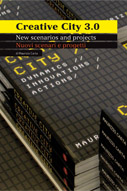 |
|
| Creative City 3.0 |
Reflections on urban creativity and experimentation as a competitive factor developed in recent years, starting with the works of Florida and Landry, resulted in further theoretical and practical considerations aimed at providing greater local and regional dimension to the creative city, leaving the rhetorical character and increasing that of the concrete effects on the quality of life. In 2007 my book "Creative City. Dynamics Innovations Actions" has identified the need for a further evolution of the concept by identifying the factors that allow the creativity to become a generator of new urban economies and creator of the new city and not simply attractive for intellectual resources. Today we need a further evolutionary step towards the creative city 3.0 so that it can continue to produce a multiplier effect on urban development and regeneration. [open]
..........................................................................................................................
|
|
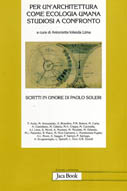 |
|
| An urban agenda for XXI century |
The evolution of cities is manifested through a settlement system in the direction of an increasingly complexity, an interaction between functions of various kinds and rank, the production of collective intelligence and the intersection of global and local flows: the collective nature of the city fights against the monofunctionality, against the land use as a paradigm and strength of identity. In the liquid society, the city strictly divided by parts and functions must be replaced by the "multiple city", not only multifunctional inside, but also node complex planetary network of cities where many are intertwined local and global networks. But the risk is that the outcome is a loss of identity to run up to the perennial external models. The emergence of diversity must be an increase of responsibility, which translates into a three-fold commitment: to the environment, to the identity and toward cooperation. [open]
..........................................................................................................................
|
|
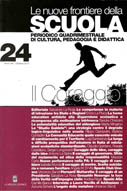 |
|
| The courage to make decisions |
The effects of the earthquake of the global economic crisis have revealed the need for a way to develop re-founded on ethics, responsibility and cooperation. The Great Illusion collapsed and buried the myth of consumerism, so we can rediscover the value of living in a society driven by knowledge, driven by the responsibility and where the decisions are based on courage.
The theme of courage to make decisions not only in ethical terms is proposed here based on my experience of public administrator to the City of Palermo, with responsibilities that require the courage to accompany the diagnosis and the ability to select actions. [open]
..........................................................................................................................
|
|
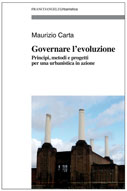 |
|
| Governing the evolution |
Govern the evolution is a complex term that underpins the commitment of more intense land use planning to act simultaneously on the side of the "guide" the process of conservation and transformation of the city and the territory and that of the "direction" of the multiple actions development carried out by local actors. The balance between the leadership and action has always been a primary goal of the discipline and practice, and it is starting from a comparison between reflection and disciplinary practices that the book develops. Govern the evolution is a "reflection in action" which, through some theoretical and critical essays and the narrative of some personal experiences of planning , leads the reader through three themes: urban regeneration through the integrated action, strengthening the cultural dimension of development and the emergence of a season in which the negotiation strategies must be tempered by the value of identity. [ open]
.......................................................................................................................... |
|
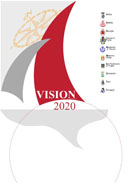 |
|
| Vision 2020. The future of Nord Barese-Ofantino |
The Strategic Plan of Nord Barese-Ofantino aims at institutional, social, business partnership and Apulia as a great opportunity to overcome the logic of the field that have characterized the process of programming and planning of the South of Italy, sons of a logic that separate and distribute rather than an integrated and selective one. The Strategic Plan is, in fact, the tool that allows to integrate - for complementarity, by aggregation, for value chain and hierarchy - the actions of conservation, development and competitiveness of the territory of the North Bari-Ofantino, accompanying the transformation from simple aggregation territorial political entity large area. [ open]
.......................................................................................................................... |
|
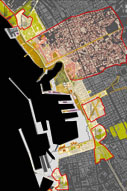 |
|
| Fluid City: the masterplan for Palermo's Port |
In recent years, urban waterfronts have produced powerful energies for innovative urban design, infrastructure armor are both portals of the planetary and declinations of fruitful creative cities: places where dense and hybrid resources, opportunities, aspirations and ambitions of the city water is a vision, create new relationships and nurture the project of modernity.
The new Port Master Plan optimizes the functions of Palermo port and redraws the urban waterfront into a new relationship between cities and water. The Port Masterplan operates simultaneously on two levels: increasing the plan of the harbor and cruise docks and designed the new "Liquid City" by increasing the marinas and introducing some of the city-port interface areas in which the project will introduce new urban uses, will produce new architectural languages and new landscape.[ open]
.......................................................................................................................... |
|
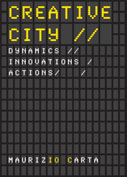 |
|
| 2008 - Creative City: dynamics, innovations, actions |
An up-to-date issue: the city investing in research, innovation and regeneration through culture and creativity are the vanguard in Europe. Cities with high quality of life, where culture, art, architecture and urban design have a powerful role and an active meaning. They are able to act on the social and urban dimension, on the generation of a new and evolving concept of urban culture.
Creative City is a research-review, an atlas of urban, landscape and architectural projects, which collect some creative good practices for transforming the contemporary city, including Amsterdam, Barcelona, Bilbao, Bordeaux, Genoa, Hamburg, Lyon, Lisbon, Marseille, Newcastle, Palermo, Rotterdam and Valencia: city creating new urban culture. The "small creative capitals" are interpreted through an atlas of maps, data, informations and benchmarks useful to understand what happens and how it evolves the Europe of cities in which we live and which visions will be open up in next years.
[ open]
.......................................................................................................................... |
|
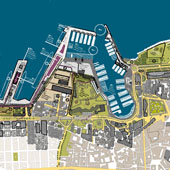 |
|
| 2007 - "Porti&Stazioni": urban regeneration in Palermo |
In Palermo the program of the Ministry of Infrastructure called "Ports & Stations” has assumed the purpose of a powerful intervention about the “re-centring of urban areas”, not only through the renovation of ports, railways and stations contexts and the allocation of new services, but especially through the redefinition or new locations of metropolitan range functions, able to use the role of "centres" and "gateways" that the railway stations and ports are gradually taking within the most advanced processes of urban regeneration and regional competitiveness.
[ open]
.......................................................................................................................... |
|
 |
|
| 2006 - Waterfront Palermo: the city of exchange and innovation |
Palermo has launched a ambitious project for the waterfront redevelopment within an overall regeneration of the port-city interactions. The guideline that identifies the pilot projects offers the vision of the new "city of trade and innovation" to the urban creativity's project. The “engine tool” of the regeneration of the new port city is “L'Officina” an atelier constituted by the Port and the Municipality as a laboratory for improving planning, design and communication.
[ open]
.......................................................................................................................... |
|
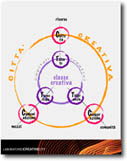 |
|
| 2005 - Creative cities: a research and an exhibition |
Today cultural policies, musical and artistic events, museums and sporting activities, exhibitions and festivals are powerfully interacting with the regeneration of urban areas in a manner so interlinked by being able to produce phenomena of "new generation" of the city: no more only the renewal of a district within a city, but the total redesign of the city starting from re-centring processes, promotion and production of new urban identity.
[ open]
.......................................................................................................................... |
|
 |
|
| 2005 - Interview by PresS/Tletter |
[open]
..........................................................................................................................
|
|
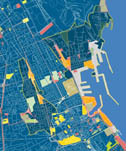 |
|
| 2003-2005 - Urban Center Palermo |
In 2003 it was established the Urban Center in Palermo, which presents itself as an information centre and a laboratory for strategies, policies and urban projects, acting as integrator of actions in the various sectors and as facilitator of processes of transformation to sustainable local development. The Urban Center in Palermo is a network formed to completion of the Urban programme.
[ open]
.......................................................................................................................... |
|
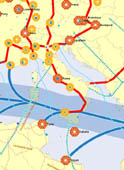 |
|
| 2005 - The Mediterranean Corridor as a competitive tool |
The goal of the study is to generate a new competitiveness scenario where the Southern territorial systems can act, with special reference to the Sicily-Calabria-Basilicata-Puglia system; through the Meridian Corridor, the design of trans- and pan-European corridors, terminals and ports, nodes and connections, strongly focused on the road-train strengthening of the Central European “hypercenter”, will be rebalanced.
The activation of the Meridian Corridor is therefore a real “territorial device” - not only for transport or trade - leading to the creation of a Mediterranean armature to requalify resources, to develop access and the economy and to promote excellence (cultural, rural and manufactural), within the framework of a Mediterranean Strategic Plan. During the phasing out of 2007-2013 Structural Funds, this latter will help define agreed policies towards common development objectives in the MEDA area, based on the balance and competitive use of local resources.
[ open]
.......................................................................................................................... |
|
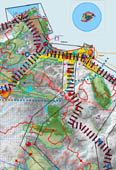 |
|
| 2004 - Structure Plan for Palermo province |
Nel maggio 2004 è stato completato il coordinamento scientifico del Quadro strutturale e degli indirizzi per le strategie territoriali del Piano territoriale provinciale di Palermo, il quale si configura come un processo-prodotto complessivo che intercetta le vocazioni territoriali, che raccoglie le opzioni di più soggetti e che compone interessi territorialmente coerenti. L'esperienza condotta dimostra una capacità del piano provinciale di produzione di “immagini del territorio” che, racchiudendo l'esito della conoscenza dell'evoluzione dell'ambiente naturale ed antropico, che si propongono come immagini connotate da una forte carica interpretativa che quindi sono capaci di offrirsi come “indirizzi per il futuro” delle comunità locali.
[ open]
.......................................................................................................................... |
|
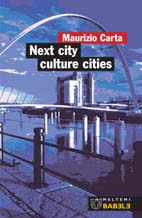 |
|
| NEXT CITY: the culture city of the future |
La città del futuro sarà sempre più una “città della cultura”, in grado di competere nel panorama internazionale attraverso la valorizzazione e la promozione della propria identità culturale. Sarà lo scenario della competizione delle energie, delle risorse umane, delle intelligenze collettive e della creatività per la costruzione di un’evoluzione più compatibile con le molteplici identità e vocazioni e più sostenibile rispetto alle risorse e sensibilità. Il processo è già evidente in molte città, protese verso la valorizzazione delle proprie culture, attraverso la sperimentazione di nuove forme sociali e la progettazione di luoghi capaci di rispondere alle nuove domande della comunità e di alimentare nuove economie.
[ open]
.......................................................................................................................... |
|
 |
|
| 2005 - European Creative Cities |
Nell'ambito della IX Conferenza Nazionale della Società Italiana degli Urbanisti (Palermo, 3-4 marzo 2005) è stata organizzata una mostra delle ricerche condotte dal Laboratorio di Urbanistica sul tema delle città europee che hanno fatto della cultura, della comunicazione e della cooperazione gli ingredienti principali della loro "creatività", utilizzata come poderoso strumento di rigenerazione urbana.
[ open]
.......................................................................................................................... |
|
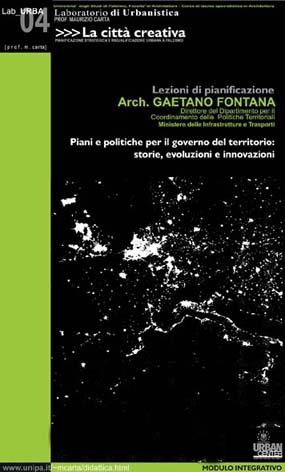 |
|
| Spatial planning and policies course (2004-05) |
Nell'ambito delle attività didattiche del Laboratorio di Urbanistica del Corso di Laurea in Architettura è stato invitato come Visiting Professor l'arch. Gaetano Fontana, Direttore del Dipartimento per il Coordinamento delle Politiche Territoriali del Ministero delle Infrastrutture.
Le lezioni si svolgeranno nei mesi di marzo, aprile e maggio 2005, articolate in cinque lezioni-seminari che attraverseranno i piani e le politiche del territorio raccontandone le storie, dispiegandone le evoluzioni e discutendone le innovazioni vissute all'interno dell'istituzione pubblica della pianificazione e del governo del territorio.
[ open]
.......................................................................................................................... |
|
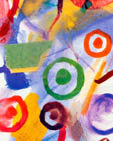 |
|
| Local Cultural Systems in Siciliy (2001-03) |
Nel 2000 è stata stipulata una convenzione tra l'Assessorato Regionale Territorio ed Ambiente ed il Dipartimento Città Territorio per l'individuazione ed interpretazione delle opportunità dell'armatura culturale del territorio regionale ai fini della individuazione di sistemi culturali locali come componenti della matrice culturale delle strategie di sviluppo regionale, nell'ambito del processo di formazione del Piano Territoriale Urbanistico Regionale. Gli obiettivi sono l'individuazione e valutazione delle ricadute sullo sviluppo regionale del potenziamento della rete territoriale delle identità culturali; e dell'identificazione degli elementi del sistema culturale capaci di costituire la base per la formazione di sistemi culturali locali che potrebbero costituire orientamento ed indirizzo per Progetti Integrati Territoriali.
[ open]
.......................................................................................................................... |
|
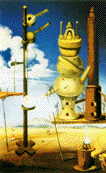 |
|
| Creative city. Cultural districts and urban regeneration |
Nell'ambito di un progetto nazionale di ricerca è stata avviata una riflessione sulle opportunità offerte dalla cultura nella rigenerazione urbana. La finalità generale è quella di fornire alle trasformazioni urbane una forte e riconoscibile matrice culturale in grado di fondare l'evoluzione della città sull'armatura culturale, cioè su quella rete composta dal tessuto del patrimonio culturale e dei luoghi della cultura ordito dal sistema dei servizi culturali, dell'educazione, dai beni culturali architettonici e dai luoghi del loisir. Durante il primo biennio della ricerca è stato prodotto un Regesto di 36 buone pratiche di rigenerazione culturale delle città, caratterizzate da una prevalente dimensione culturale delle politiche di rigenerazione urbana.
[ open]
.......................................................................................................................... |
|
 |
|
| Regional Geographic Information System (2001-02) |
Il progetto è stato commissionato dal Dipartimento Regionale dell'Urbanistica, e riguarda la costituzione e l‘attuazione di un sistema informativo territoriale regionale organizzato a rete nel territorio regionale, attraverso la connessione di 41 soggetti territoriali (Regione, Province, Comuni), finalizzato alla condivisione delle informazioni geografiche ed al potenziamento dei servizi al cittadino ed alle imprese che possono essere erogati attraverso le infrastrutture ICT. Il progetto è stato redatto, insieme a Goffredo La Loggia, all’inizio del 2001 e finanziato alla fine dello stesso anno per 46,95 Milioni di Euro. Oggi è stata completata la progettazione del nodo regionale ed è stato stipulato l’Accordo di programma per l’avvio e le attività dei 40 nodi territoriali.
[ open]
.......................................................................................................................... |
|
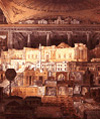 |
|
| Interpreting our Cultural Heritage (2000-02) |
La crescente complessità delle trasformazioni territoriali e l'estensione delle relazioni locale/globale necessita di una revisione delle metodologie di pianificazione e dei relativi strumenti di piano, soprattutto di quelli relativi alla conoscenza ed alla comunicazione dei valori e delle risorse territoriali. Nuovi strumenti cognitivi e comunicativi costituiscono il primo passo verso il governo democratico delle trasformazioni territoriali. La ricerca esplora casi concreti di pianificazione interpretativa e propone metodologie e strumenti utili alla pianificazione dello sviluppo culturalmente sostenibile.
[ open]
.......................................................................................................................... |
|
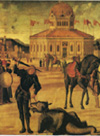 |
|
| The Territorial Cultural Framework (1999-2002) |
L'obiettivo della ricerca è quello di proporre una nuova attenzione al territorio affrontato come sistema culturale complesso, come esito di processi stratificati nel tempo e come opportunità creativa per nuove interpretazioni, interventi compatibili e valenze economiche messe dalla storia e dalla cultura sul tavolo della competizione. Il libro propone, attraverso l'analisi di alcuni casi internazionali ed italiani, un vasto quadro di opzioni, tutte confluenti nella direzione dell'attribuire un valore strategico alla qualità territoriale ed alle identità culturali dei contesti locali, del leggerle come risorse da conoscere, interpretare, conservare, incrementare e comunicare.
[ open]
.......................................................................................................................... |
|
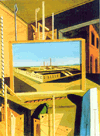 |
|
| The City of Opportunities (1997-98) |
La ricerca riguarda l'analisi del sistema delle aree dismesse nel Comune di Palermo, finalizzata all'individuazione di opportunità di recupero capaci di costituire un nuovo sistema di centralità urbane caratterizzate dalla matrice culturale delle funzioni.
[ open]
.......................................................................................................................... |
|
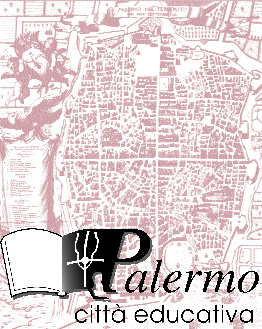 |
|
| Palermo Educational City (1997-98) |
Il Progetto Palermo Città Educativa, nato dalla collaborazione tra il Comune di Palermo e la Cattedra di Pianificazione del Territorio, si propone come obiettivi a medio termine la valorizzazione del territorio urbano attraverso l'incremento e il miglioramento dei servizi culturali e formativi e la valorizzazione delle risorse culturali espresse dalla città.
[ open]
.......................................................................................................................... |
|
|


































